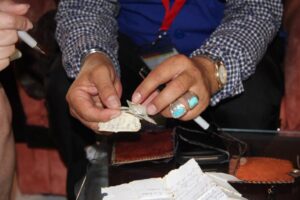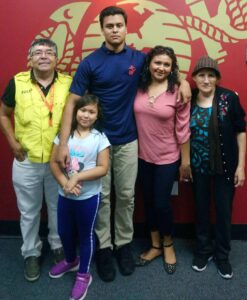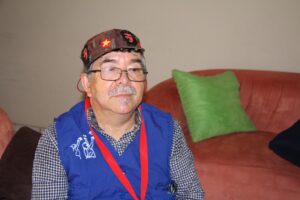TULIO SERRANO
(originally – Estaban Marino de Paz)
Written by Caroline Sheaffer
“I carry Psalm 19 in my wallet. It was like we mutually protected each other (during the war)” he shares. “I read it when I’m troubled.”
Esta historia se escribe en Español = This story is also written in Spanish. Click here.
Before we even talk to Tulio, we sense a deep and abiding commitment to his cause. Tulio’s attire begs a conversation from his decorated hat to his vest to his badge and lanyard. He is only too happy to describe his reason for being in El Salvador for three weeks. He is there to serve! And he can’t wait to tell us in detail. Once we find a mutual time to chat, he brings along several brochures explaining CRECE* and a copy of his own dictated bilingual autobiography, El Terco Deseo de Crear un Major, which I read before our interview.

[*CRECE, Central American Refugee Committee, based in Oakland, California, is a nonprofit organization whose donations support the immigrant and refugee populations both in Oakland as well as throughout much of El Salvador. Tulio helped to found this group that tirelessly fund-raises throughout the year in order to gather and purchase medical equipment, school supplies, computers, sports equipment, clothing, and personal hygiene items. Tulio ships supplies to El Salvador by using a large cargo crate on a ship. He and his team members then handle the responsibility of distributing these items to several hospitals, medical and dental clinics, sports clinics, etc. in the designated communities within El Salvador at least annually. CRECE also provides educational scholarships.]
Tulio seems to live in two countries, two worlds. He has dual Salvadoran and U.S. citizenship which allows him to travel freely between the two countries to ensure the CRECE work is carried out properly. He now legally lives in California with his family but shares some background about his country of origin which he serves with much devotion.
Tulio was born on January 3, 1961, in El Salvador, the third of seven children, and was raised in a poor community, Rosaria-Maria, Tenancingo, in Cuscatlan department. His dad worked in the agricultural sector farming beans, corn, rice. His home had no potable water. He recalls living on tortillas with salt and lime juice when the corn and bean harvest was bad. Three eggs would be divided into 7 servings. Once he remembers borrowing one tablespoon of salt and three beans from a neighbor. Tulio began working at age seven. When he was older, he left to work in the coffee fincas in the western part of the country.
His parents were too poor to send him and his siblings to school. His whole family believed in liberation theology — Christ for the poor — taught by the local catechist. The poor people were becoming aware of the injustices and exploitation and aspired for a better world. First threats were made, then persecutions; later it was murders and massacres to any organized group disagreeing with government policies. Growing up during this volatile time in the country’s history, he witnessed many catechists and priests being assassinated.
At age 14 Tulio saw the need for social change and became involved in political activity within the church and educational meetings. Christian-based communities were forming. The only way to defend themselves was to join the FMLN forces against the military repression to denounce the government. Tulio was aware he was targeted when his friends began disappearing and roads were blocked. Sentries were posted in the village, but one night when the sentry fell asleep, someone in his village decapitated the sentry and hung his head from a tree. Strangers appeared the next day and captured six youth, and helicopters shot the hermitage, a place of religious retreat in the town. Houses of all organizers were destroyed, and many people were tortured, degraded, and humiliated.
He was 19 when members of the military looted and destroyed his house; the soldiers captured his other siblings and forced him to watch his only sister being brutally raped and killed. He was unable to intervene. The military burned Tulio’s village, poisoned the corn, killed the animals, destroyed the granaries. It was part of the military’s “Scourged Earth” and Anvil and Hammer strategy. Tulio lost 31 family members; four others were wounded during the war.
Those who survived the torture in his village became refugees or engaged in FMLN activities. Tulio’s best friend joined the military’s National Guard. The two of them never spoke after that day including years later when they met by chance in the U.S. and Tulio tried to engage his friend in conversation; however, his friend rejected him. He is quite hurt by that betrayal.
Tulio’s organizer role in the FMLN was to lead the innocent folks to safety when the military was hunting them. They were taking the people, often women and children, to refugee camps to keep them safe. Calle Real was one camp outside San Salvador; Mesa Grande was another one in Honduras across from Chalatenango department. They traveled as soon as it became dark, which was around 6 PM, and moved throughout the night when they could not be detected by military planes. This guinda was tiring, and they ate what they could find – plants and fruits. Frequently they made soups which they could stretch to feed many people. He didn’t carry a weapon. One-fifth of the country became displaced during the war. It was a lost decade.
He carries Psalm 19 in his wallet which his mom gave him when he went to war. “I hid it in a compartment of my wallet to protect it from rain, sun, and sweat. It was like we mutually protected each other,” he shares. He still carries it in his wallet despite its tattered and torn appearance. “It is very special to me,” Tulio shares. “I read it when I’m troubled.”

In 1989 Tulio left for his journey to the U.S. explaining that his security was at risk; he had been persecuted, and he was physically and emotionally unwell. A friend worked through a priest in Mexico to arrange a visa to that country. That was the beginning of a network of others who put into motion an “underground railroad” of sympathetic folks who helped Tulio get to California to seek political asylum. They even had a job waiting for him.
Tulio has had the opportunity to begin a new life in a safer place. At that time his reasons for seeking political asylum were still regarded as legitimate ones in the U.S. court system. He is a legal citizen. Tulio has always been grateful for the opportunity to live and work in the U.S. and does not take that for granted.
This new setting allowed Tulio the chance to begin to heal the deep wounds in his soul. Those invisible wounds that threatened his internal peace are always with him. He says he never recovered from his illnesses that forced him to leave El Salvador. Tulio never received any treatment for all the trauma he experienced during his life. He simply learned to cope. His worst time is at night when he has insomnia.
Tulio is very proud of his family. Asked about each family member, his responses include “very nice, very intelligent, very hard-working.” One of his children is a college graduate. One is an active duty Marine; another works in construction. The little nine-year old daughter enjoys accompanying Tulio to El Salvador to distribute items to needy people.

His family supports his efforts with CRECE, sometimes joining him in distributing the donated items to the places that appreciate and need them. He rattles off names of three hospitals where he must deliver wheelchairs, walkers, and canes. The day after we met, he organized a dental clinic where area dentists volunteered their time to treat those unable to afford dental work. He told us about the 23 youth his group is supporting with financial scholarships to university explaining the selection process. He would like to purchase a house for them to live in to cut down on the transportation and housing costs for them. Tulio works in thirteen different communities around the country.
In the Oakland area CRECE offers ESL classes, mental health clinics, hosts social events such as dinners and holiday celebrations and dances, helps communities recover after natural disasters, awards scholarships, and offers medical supplies.
Tulio works only a part-time paying job but “I don’t need much to live on and don’t need personal gains. The situation is so difficult for the poor people in El Salvador, so my ability to give to the poor gives me purpose. This is the best thing in my life.” Tulio would like to come to El Salvador four times a year if enough donations warranted the trips. That would mean his organizing and preparing lots of tamales and pupusas as fundraisers to sell at local festivals. This volunteer agency keeps him very busy. It gives him no time to think about his worries.
The yearning for social transformation has directed Tulio’s life. He longs for dignity and justice and dedicates his life to strengthening the communities he lives in both in California and in El Salvador. “The best thing in my life is the ability to give to the poor,” he proudly shares with us.

Tulio has worked hard to re-configure a new life that allows him to contribute to the folks he left behind in El Salvador while helping him deal with the deep wounds he carries with him: of memories haunting him that took place there when he was a young man. He seems to manage balancing the two different worlds to make it work for him.
That same Psalm 19 on a scrap of tattered paper his mother gave him during the war remains in his wallet serving as a talisman to remind him of his former life, as well as carry him through the current tough times of his present life.


